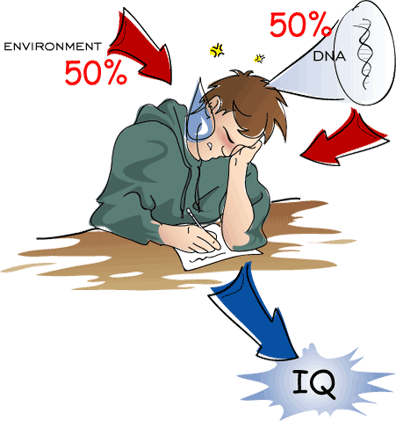Over the years, scientists have never specifically defined intelligence, but they do use a term for "general mental ability," also known as, "g." This basically quantifies the amount of intelligence a person has (most of us know this process
as the IQ test). But my question isn't really how the intelligence is counted. Many people make a distinction between "book smarts" and "street smarts." That distinction aside, exactly what factors affect how much "smarts" a person actually has?
My AP Bio classmates will remember some of the reading we did during the summer about learned and innate behavior. Innate behavior is basically behavior shaped by genetics, while learned behavior is exactly what it sounds like, behavior that is learned. I do think that genetics plays a very huge part in an animals' intelligence. However, it is way too complicated to be explained by single-gene crossings. Really, it is a combination of thousands of genes, all working together to give a person either phenomenal, average, or poor brain capacity. I think genetics lay the foundation for the potential of the animals' intelligence (I say animal, but I really mean humans). An example of this is that, genetically, someone with perfectly normal genes may have less brain capacity than someone who's autistic to the degree that they possess a better-than-average memory and analyzing capabilities (social and other implications aside). Worth being noted is the fact that sometimes there are trade-offs in terms of intelligence. For example, proficiency in math might be accompanied with the near inability to write proper grammar. This might to the fact that different sides of the brain handle different things. Reasoning and art are handle different areas of the grain, and one area may be stronger.
However, the potential is not enough, as many people know. We all know people who are
very smart, but freeze up at the sight of a certain subject or can't very well analyze reading material. This might be due to the fact that they do not practice. I'll use myself as an example. I knew how to read and write before I actually went to school. This was because, with the parents I had, I was forced to read and practice writing every single day, even though I was so young. Studies have proved that simple practice early on in life is all it takes to get really good at a certain subject. The brain basically gets used to using particular channels and as you use them more and more, it becomes way easier. Keep in mind that the time period in which you practice affects the intelligence as well. For example, in the mid-nineteenth century, a girl was found who had barely any speaking, reasoning, or any skills at all to speak of. This girl had been born to abusing parents who literally kept her locke
d in a single room her entire life. When she was found she was sixteen. Even though scientists tried to teach her certain things, such as speaking, math, reading, and even social skills, they failed miserably. At her age, she was still not able to understand that she couldn't constantly masturbate in public, or understand that nonsensical shouts and grunts weren't enough to communicate. In very harsh words, scientists could barely find anything that really made her human. This was because she had passed her imprinting period. This is the period at which an animal learns best from its environment, parents, and peers. Deprived of all these three things, she had passed her imprinting period learning nothing, and there was no longer any way to fix that. Also, this girl did not have any learning/cognitive/mental disabilities to speak of. No matter how much potential she may have had through her genes, she did not have any opportunity to practice. And, no, I am not making this up.

These are basically my hypotheses on what affects a person intelligence. I think that this reasoning could also be applied to other things as well. For example, whether someone is predisposed to feeling a certain emotion, or really someone's personality as a whole. If genes dictate that you have more of a hormone or neurotransmitter or something that would make you feel a certain emotion, then you have a genetic foundation for your general personality. However, your environment affects you a lot as well, and it is this interaction between genes and experiences that affect you.
What is really interesting is the study of savants. Here is a video of musical prodigy named Derek. There are many more examples of people that are savants.
ReplyDeletehttp://www.youtube.com/watch?v=Ak2jxmhCH1M